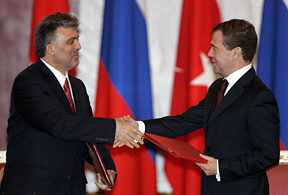That’s what it’s all about:
According to the Bild newspaper, the German Bundeswehr is studying scenarios in which Russia could attack the West bevor the summer. The situation could escalate in the coming winter, the document continues.
In the summer of 2025, NATO could finally deploy 300,000 troops to Ukraine’s eastern flank. While Ukraine is aiming for a summit at the highest level on its peace plan, Russian President Vladimir Putin probably has other intentions: According to a training plan of the German Defense Ministry, the Kremlin chief could prepare a hybrid attack on NATO as early as next winter. This is reported by the “Bild” newspaper.
In the secret report, the German Defense Ministry outlines in detail a possible “path to conflict” between Russia and the Western defense alliance. Month after month, both Russian and Western actions are described. Among other things, the Bundeswehr expects the mobilization of hundreds of thousands of NATO soldiers and an imminent outbreak of war in the summer of 2025, according to the “Bild”. Large-scale Russian manoeuvres from September Russia wants to call up another 200,000 men into the army soon to launch a new offensive against Ukraine in the spring.
In the summer months, Russia would then begin increasingly open attacks on the West – including through severe cyberattacks. The large-scale “Zapad 2024” manoeuvre with 50,000 troops is scheduled to start in western Russia and Belarus in September.
At the end of the year, there would be a Russian invasion of areas of eastern Ukraine, whereupon NATO is to deploy around 300,000 soldiers to Ukraine’s eastern flank on the so-called “Day X” in the summer of 2025. Different scenarios considered The Ministry of Defense declined to comment on the information.
Only this much: “Basically, I can tell you that the consideration of different scenarios – even if they are extremely unlikely – is part of everyday military business, especially in training,” a spokesman for the ministry told Bild. Just last week, Swedish security experts warned of the danger of war with Russia. “Many have said it before me, but let me say it by virtue of my office: there could be a war in Sweden,” said Carl-Oskar Bohlin, Sweden’s Minister of Civil Protection.
Everyone must prepare for the worst-case scenario, such as a war with Russia, before it is too late, Bohlin said.



